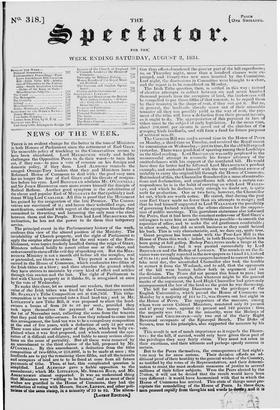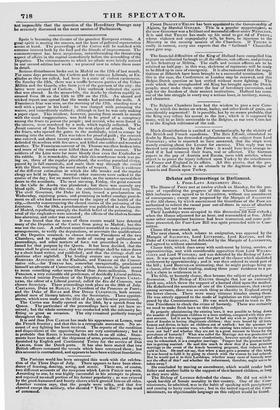NEWS OF THE WEEK.
THERE is an evident change for the better in the tone of Ministers in both Houses of Parliament since the retirement of Earl GREY.
The miserable policy of truckling to the Conservatives seems to
have been abandoned. Lord MELBOURNE wisely and boldly challenges the Opposition Peers to do their worst—to turn him
out, if they can—to pass a vote of censure on his foreign and
domestic policy, if they dare. Lord ALTHORP reminds the enraged Orange-Tory leaders that they and Ministers have a
Reformed House of Commons to deal with : the good easy man
has no longer the fear of Earl GREY and his threats of resigna- tion before his eyes. Lord BROUGHAM adulates Mr. O'CONNELL ; and Sir JOHN HOBHOUSE once more avows himself the disciple of Radical Reform. Another good symptom is the substitution of the clever and popular Earl of MULGRAVE for that (publicly) inef- ficient Whig Lord CARLISLE. All this is proof that the Movement has gained by the resignation of the late Premier. The Conser- vatives are convinced of it ; and hence their unbridled rage, and mortification, combined with regret at the egregious blunder they committed in thwarting and harassing the only man who stood between them and the People. Even had Lord MELBOURNE the inclination, he has not the power to do them that temporary service.
The principal event in the Parliamentary history of the week, confirms this view of the altered position of the Ministry. The inviolability of Church property, and the right of Parliament to apply the surplus after providing for the real wants of the Esta- blishment, were topics tenderly handled during the reign of GREY. Ministers refused boldly to assert either one or the other, and endeavoured to stave off the evil day of speaking out. But the MEL- BOURNE Ministry is not a month old before all the scruples, real or pretended, are blown to atoms. They permit a motion to be carried in the House of Commons, which confiscates two-fifths of the Irish tithes at a blow ; and thus abandon the ground which they have striven to maintain by every kind of effort and artifice through this session and the last. The right of Parliament to deal with Church property as it thinks fit, is recognized at once by the vote of Wednesday. To make this clear, let us remind our readers, that the annual value of the Irish tithes was fixed by the Commissioners under Mr. STANLEY'S Tithe Composition act at 646,7031. This tithe- composition is to be converted into a fixed land-tax ; and in Mr. LITTLETON'S new Tithe Bill, it was proposed to allow the land- owners a bonus of from 20 to 40 per cent., provided they. took upon themselves the payment of the money before the 1st of November next, collecting the same from the tenants that they paid the tithe-owners. In case they refused to come into this arrangement, the land-tax was to be a compulsory composition at the end cf five years, with a deduction of only 15 per cent. There were also some other parts of the plan, which we fully ex- plained when it was first proposed, and which rendered the ope- ration of it difficult and dilatory, and liable to many serious objec- tions on the score of partiality. But all these were removed by an amendment to the third clause of the bill, proposed by Mr. 0 CormEm.. By this amendment, a deduction from the tithe composition of two-fifths, or 258,000/, is to be made at once ; the landlords are to pay the remaining three-fifths, and all the tenants and occupiers of land are to to be freed at once from all future payments of tithe. Thus, at last, this complicated question is simplified. Lord ALTHORP gave a feeble opposition to the amendment; which Mr. LirrLETo.se Mr. SPRING RICE, and Mr. ABERCROMBY almost supported. It was an understood thing that Ministers were "willing to be beaten;' and as most of their wishes are gratified in the House of Commons, they had the satisfaction of voting with Messrs. SHAW, LEFROY, and other poli- lamas of the same stamp, in a minority of 33 to 82. The alters-
tion thus effected rendered the grea!er part of the bill superfluous; so, on Thursday night, more than a hundred clauses were ex- punged, and twenty-two new ones inserted by the Committee. Last night, the discussions in Committee were brought to a close, and the report is to be considered on Monday. The Irish Tithe question, then, is settled in this way : instead of abortive attempts to collect between six and seven hundred thousand pounds from the occupiers of land, the landowners will be compelled to pay three-fifths of that amount, to be repaid thou by their tenantry in the shape of rent, if they can get it. But as, in general, the landlords already screw out of their miserable tenantry all they can possibly yield in the way of rent, the pay- ment of the tithe will form a deduction from their present income,
as it ought to do. Tie: appropriation of this payment in lieu of tithes must be the subject of early legislation. In the mean time, about 390,0001. per anuurn is saved out of the clutches of the grasping Irish landlords, and will form a fund for future purposes of national benefit.
The Coercion Bill was read a second time in the House of Peers on Monday, a third time on Tuesday, and received the Royal assent by commission on Wednesday,—just in time, for the old bill expired
yesterday. There was a good deal of sparring among their Lordships on the third reading. Lord BROUGHAM was sadly perplexed in the
unsuccessful attempt to reconcile his former advocacy of the
omitted clauses with his support of the mutilated bill. He would have done far better had he followed Lord MELBOURNE'S prudent
example, and contented himself with the very sufficient excuse of inability to carry the original bill through the House of Commons. But instead of this, the Chancellor floundered in a mass of contradic- tions and declamation, and superfluous talk about a certain cor-
respondence he is in the habit of carrying on with Lord WE LLES.• LEY, and which he declares, truly enough we doubt not, is quite
unfit for production. One or two facts, however, the Chancellor
let out, which are worth notice. He stated, that during the past year Earl GREY made no fewer than six attempts to resign ; and that he had himself suggested to Lord WELLESLEY the possibility of governing Ireland without the odious clauses for the suppres- sion of public meetings. This garrulous statesman also informed the Peers, that it had been the constant endeavour of Earl GREY'S colleagues to save him as much trouble as possible—to smooth the asperities of office, and to make the old gentleman comfortable; in other words, they did as much business as they could behind his back. This is very characteristic, and, we dare say, quite true.
Great progress has been made with the Poor-Law Bill in the House of Peers this week : indeed, in both Houses legislation has been going at full gallop. Bishop PHI L POTTS made a lunge at the bastardy clauses ; but it was parried successfully by Lord BROUGHAM and the Bishop of LONDON. The numbers on the di- vision were wrongly reported in the newspapers as 14 and 13, instead of 38 to 14 ; and though the newspapers hastened to correct the mis- take next day, the unsatisfied Chancellor also took the trouble to correct it from the Woolsack, and to add, that the opponents of the bill were beaten hollow both in argument and on the division. The Times did not permit this boast to pass ; but proved satisfactorily enough, that whatever might be the general merits of the argument, the Lord High Chancellor had grievously misrepresented the law of the land on the point he was discussing. The bill for admitting Dissenters to the privileges of the English Universities, which passed the House of Commons on Monday by a majority of 164 to 75, was thrown out last night in the House of Peers. The supporters of the measure, among whom were seven Cabinet Ministers, mustered only 38 present and 47 proxy votes, against 85 present and 102 proxies : thus the majority was 102. In the minority, were the Bishops of DERRY and CHICHESTER—Only two OUt of the thirty Right Reverend occupants of the Episcopal Bench. The Duke of SUSSEX, true to his principles, also supported the measure by his vote.
This result is not of much importance as it regards the Dissen- ters ; for the bill, if carried, would only have given them part of the privileges they may fairly claim. They must not relax in their exertions, and their ultimate and perhaps speedy success is certain.
But to the Peers themselves, the consequences of' last night's vote may be far more serious. Their decision affords an ad- ditional proof of their hostility to the general wishes of the Country, as testified by the votes of its Representatives, and their determi- nation to resist the most moderate measures of justice to several millions of their fellow subjects. Were the Peers elected by the Nation, it will not be denied that the result would have been very different : it would have harmonized with that to which the House of Commons has arrived. This state of things must pre- cipitate the remodelling of the House of peers. In these days, men proceed rapidly from thoushts and words to.--k.and it is sot impossible that the question of the Hereditary Peerage may be seriously discussed in the next session of Parliament.





















 Previous page
Previous page